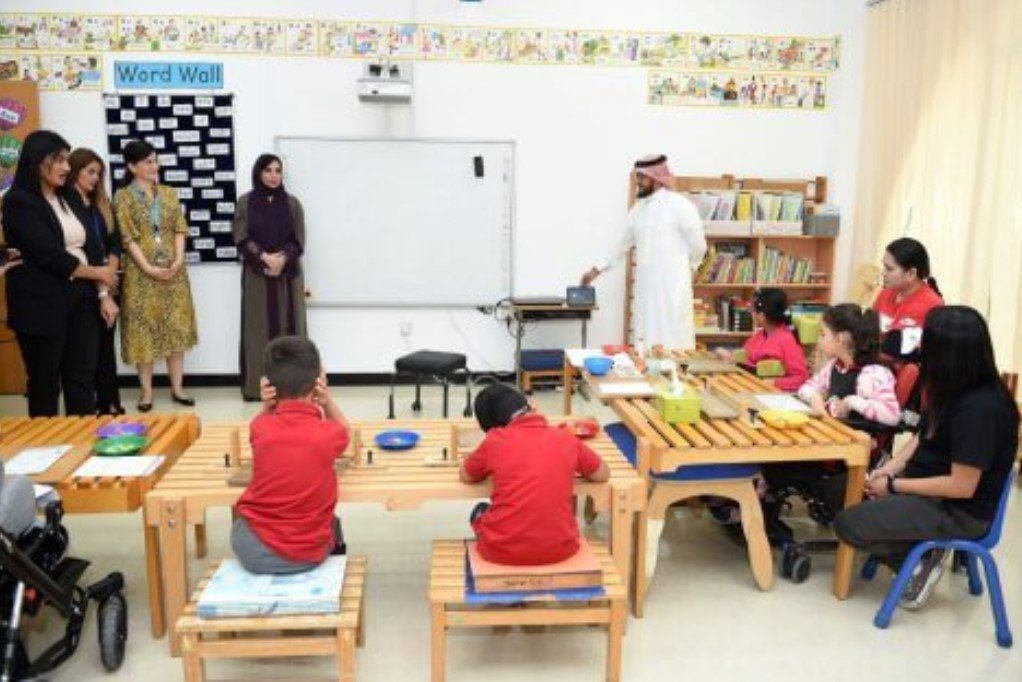
Rashid Center, Amazon and Alexa Technology, A photo by tahawultech
Amazon’s Alexa Technology at Dubai’s Rashid Centre
In a remarkable move blending innovation with inclusivity, Amazon MENA and the Rashid Centre for People of Determination have unveiled a partnership that utilizes Amazon’s Alexa technology to enhance the lives of students with unique needs. This partnership underscores a broader commitment to digital accessibility, employing AI tools to help children with determination achieve greater independence, interaction, and autonomy in their daily lives.
This initiative emerges as part of Amazon’s ongoing efforts to support local communities, particularly by making advanced technology accessible to individuals who may face challenges in traditional learning environments. The partnership was celebrated through the launch of Amazon.ae’s Eid eGift Cards, designed by talented students at the Rashid Centre, reinforcing the theme of inclusivity and cultural pride. Amazon has integrated these eGift cards with colorful artwork inspired by Eid, showcasing the creativity of children from the Rashid Centre and highlighting the company’s commitment to local heritage and diversity.
From AI Assistants to Inclusion
Digital assistants like Alexa have revolutionized accessibility across a variety of fields. Initially designed for home automation and general consumer convenience, AI-driven voice assistants have gradually evolved to address diverse needs—from assisting the elderly to supporting those with physical disabilities. Over the past few years, the integration of such technology in educational settings, especially for people of determination, has brought a new dimension to personalized learning and interaction.
The Rashid Centre has long been a champion for inclusive education, providing therapies and support for students with varying needs. Historically, the journey to a more accessible tech landscape has been gradual, requiring collaborative efforts to adapt AI applications for education and accessibility purposes. Amazon’s involvement is another milestone in this journey, fostering digital empowerment among young people in the UAE who benefit from a tech-forward environment adapted to their specific learning needs.
Alexa’s Role at the Rashid Centre
This partnership isn’t merely symbolic but introduces real-world applications of AI in the learning environment. Alexa-powered devices have been installed across the Rashid Centre campus, enabling students and teachers to interact with various facilities and complete daily tasks using voice commands. Students can now use Alexa to assist with simple tasks, from turning on lights and controlling room temperature to retrieving information and playing educational games.
By providing these tools, Amazon and the Rashid Centre aim to promote digital autonomy, allowing students to accomplish tasks independently and with greater ease. This step is transformative not only for the students but also for teachers, as it enables them to manage classroom environments more efficiently, freeing up time to focus on individualized support.
Amazon MENA’s Regional General Manager, Dr. Raf Fatani, emphasized the significance of this project, stating, “Promoting an inclusive culture that encourages development for all is a core belief at Amazon. We strive to make Alexa easily accessible, so everyone can benefit from accomplishing tasks through simple commands. This partnership exemplifies how technology like Alexa can increase independence.”
Comparative Analysis: Real-World Applications and the Global Push for Inclusive AI
Globally, several institutions have adopted AI tools to support diverse learning communities, with varying levels of success. For example, in the United States, AI technology has been used in classrooms to support children with autism by providing structured interaction without human intervention, helping them to develop social and cognitive skills in a controlled manner. Similarly, schools in Europe have integrated AI to assist children with visual impairments, enabling them to participate in activities that were previously inaccessible.
Compared to these programs, the Rashid Centre’s Alexa initiative is a unique blend of cultural relevance and technological inclusivity. The ability for students to use their voice to accomplish tasks in an environment that respects their cultural values (such as celebrating Eid through custom-designed eGift cards) demonstrates how AI can be tailored to both support and celebrate the communities it serves.
How Users Can Leverage Alexa for Inclusive Learning
For those interested in implementing Alexa or similar AI tools in educational or home settings for people of determination, here are a few actionable tips:
- Personalize Settings: Customize Alexa routines to cater to specific needs, such as scheduling reminders for daily tasks, setting up flash briefings with relevant educational content, or turning on calming music to help with focus.
- Enable Accessibility Features: Alexa offers features like voice-controlled devices, which can be further customized through Amazon’s accessibility options, making it easier for users with motor impairments to control appliances hands-free.
- Use Alexa Skills for Learning: Explore skills designed for learning, such as trivia games, storytelling sessions, or interactive quizzes that can make the learning experience more engaging for users.
- Involve Family and Caregivers: Integrate family members and caregivers into the Alexa experience. For instance, Alexa can remind caregivers of important tasks or alert them when specific routines are activated.
Technology Bridging the Gap
A poignant example of Alexa’s impact comes from Zainab, a young student at the Rashid Centre, who shared that her favorite feature is being able to “ask Alexa anything.” For Zainab, the technology doesn’t just answer questions; it provides a sense of empowerment. “It feels like Alexa listens to me and helps me like a friend,” she said. This simple interaction reveals how technology can be an equalizer, allowing children to feel capable and heard.
Another teacher at the Centre recounted how Alexa allowed her to manage classroom logistics more smoothly, giving her more time to spend one-on-one with her students. The teacher explained, “It’s not just about automating tasks; it’s about creating a smoother, more supportive environment where every student can thrive.”
The Future of AI in Education and Accessibility
The collaboration between Amazon and the Rashid Centre raises some thought-provoking questions:
- How far can AI go in bridging the accessibility gap in education, especially for students of determination?
- Could there be unintended effects of over-relying on technology in the classroom, potentially impacting social interactions?
- How can other companies emulate this model to support inclusive learning experiences in different cultural contexts?
By bringing these questions to the forefront, Amazon and the Rashid Centre are prompting both educators and technology providers to consider not only the capabilities of AI but also its broader social implications. In a world where inclusivity is increasingly recognized as essential, partnerships like this one offer a promising model for how technology can both empower individuals and celebrate the diversity of every community.





